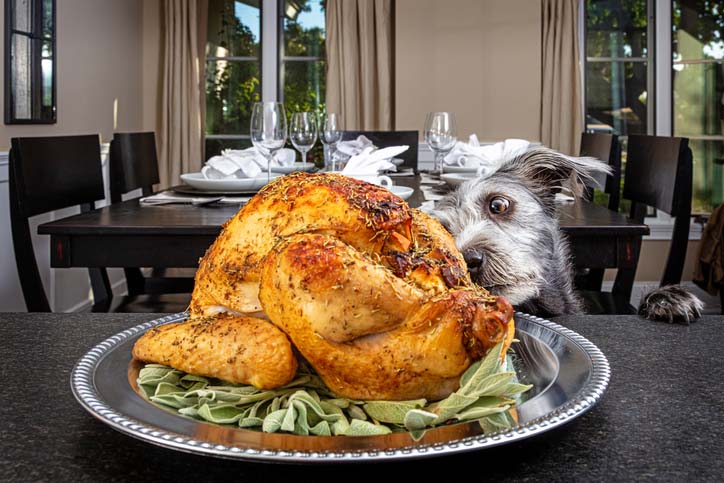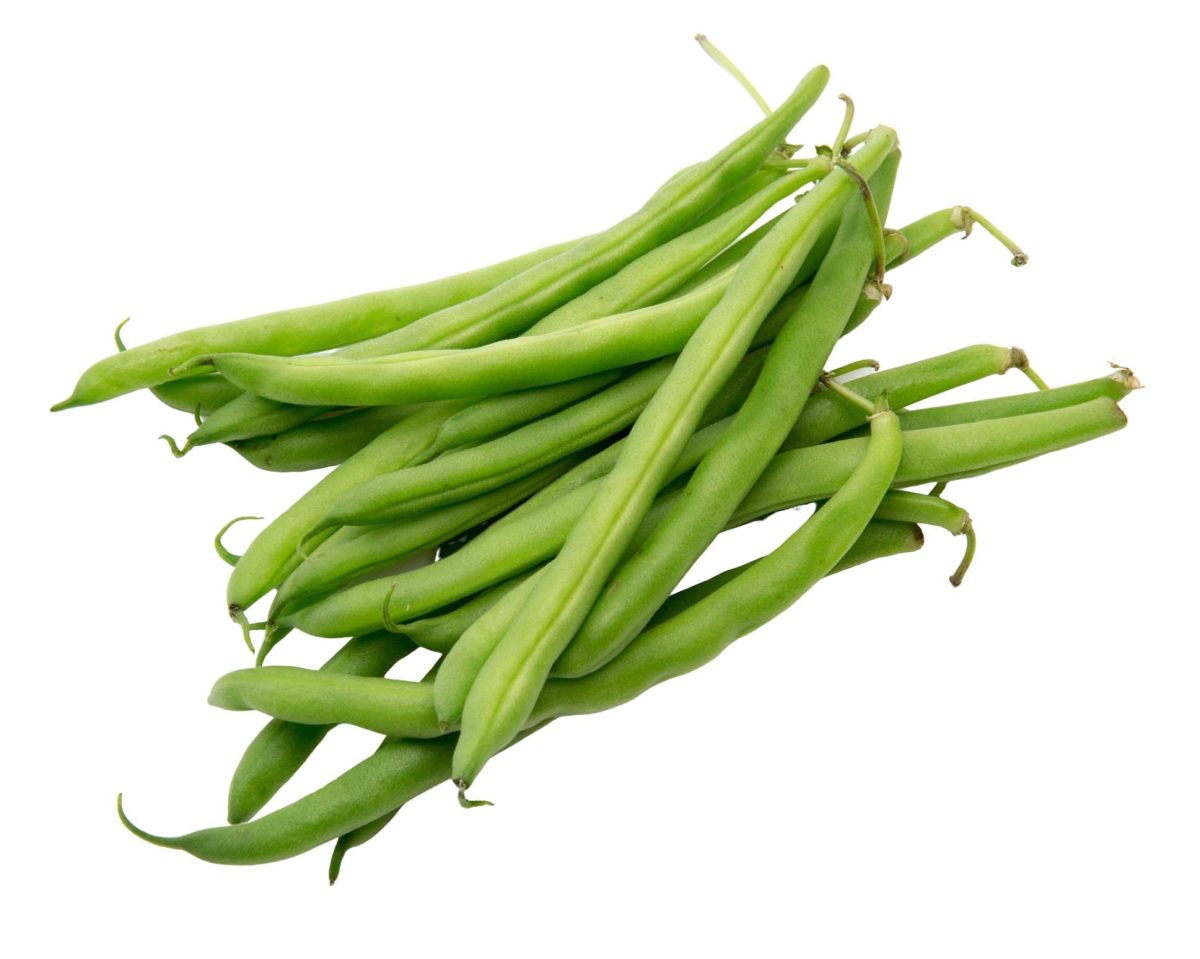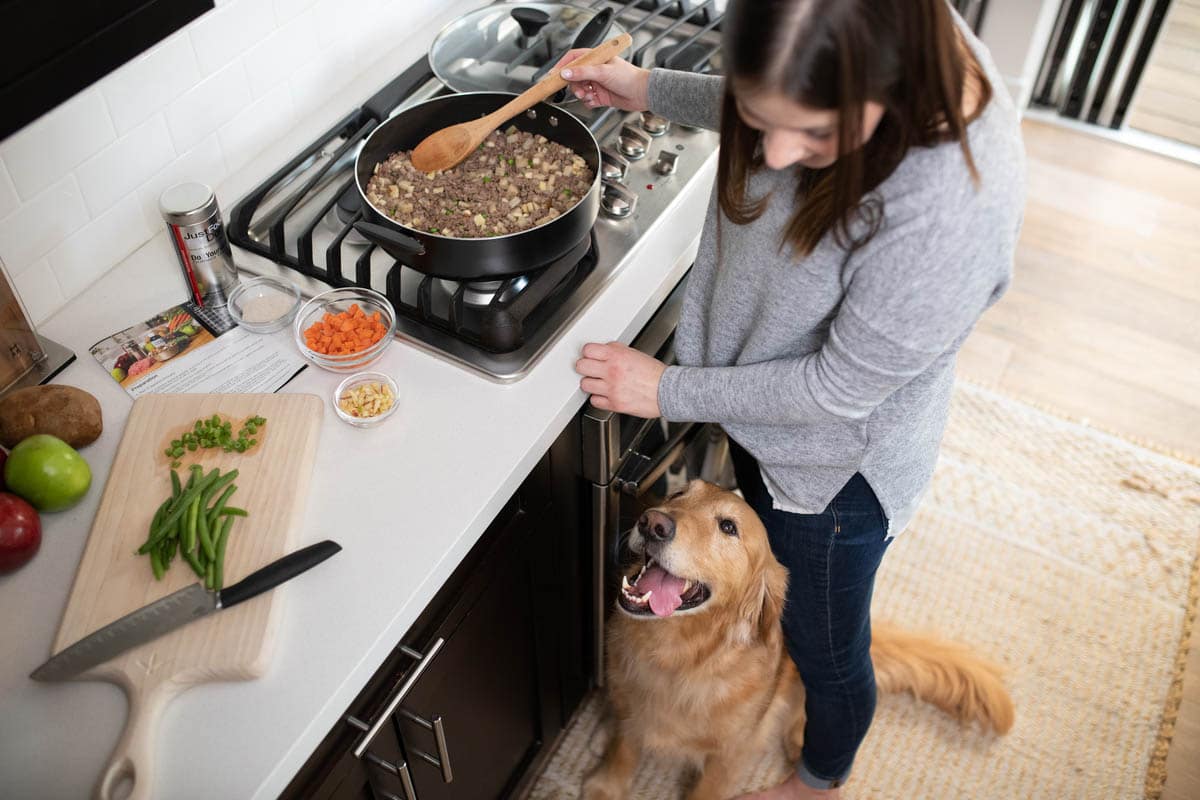Can Dogs Eat Turkey? The Ultimate Guide
Can dogs eat turkey? Under certain conditions, absolutely.
What pet parent hasn’t slipped their furry best friend a nibble or two under the table? While table scraps aren’t always the best nutritional option for doggos, JustFoodForDogs was founded upon the knowledge that many whole, delicious “people foods” can benefit humans and canines alike. One such food is turkey.
While it is safe for dogs to eat turkey, that doesn’t mean that pet parents should share slices of the Thanksgiving bird or a bite of a turkey sandwich. Before letting your dog chow down, take proper preparation and nutritional balance into consideration.
If you want to start adding turkey to your dog’s diet, here’s what you need to know.
IS TURKEY GOOD FOR DOGS?
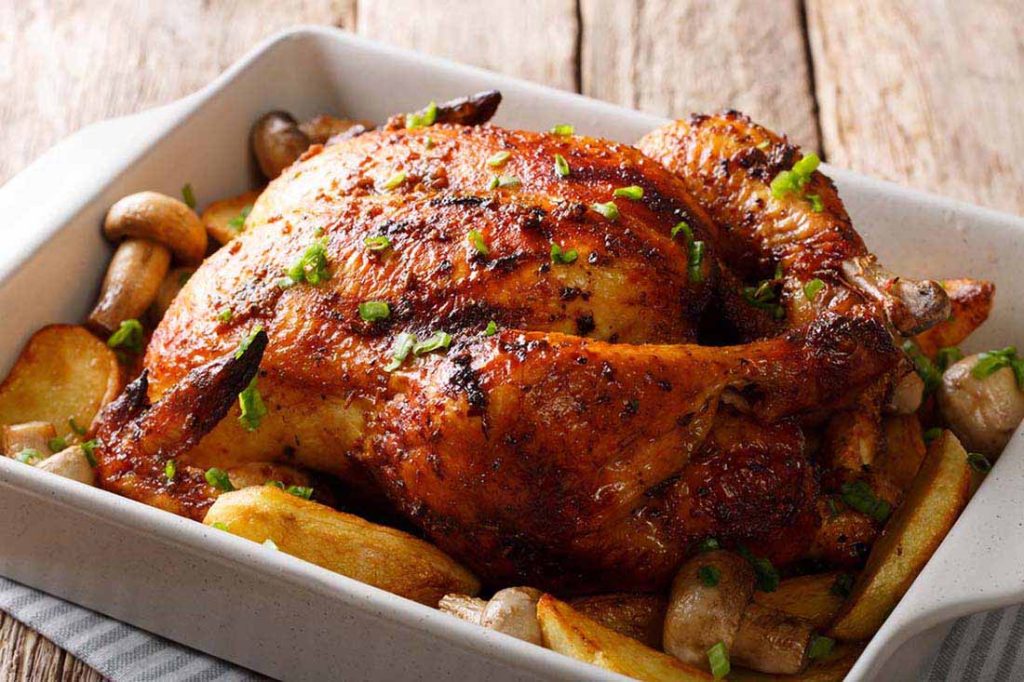
Can dogs eat turkey? Yes, they can. When it comes right down to it, experts agree that turkey can be good for dogs… IF it is prepared correctly and is part of a nutritionally balanced diet.
Board Certified Veterinary Nutritionist, Dr. Dan Su, MS, DVM, DACVIM-Nutrition, explains, “Turkey is a good source of lean protein, amino acids, vitamins, and other nutrients.”
Nutrients found in turkey include:
- selenium
- niacin
- iron
- zinc
- phosphorus
- potassium
- B vitamins
Su recommends ground turkey as the easiest way to incorporate turkey into your dog’s diet. White meat and dark meat, turkey skin, and turkey organs all have dietary value as well.
He adds, though, that pet parents should familiarize themselves with the nutritional properties of the different parts.
“For example, turkey skin has a very high fat content. That’s OK in small portions. Too much could cause your dog to gain weight and may lead to health issues like pancreatitis,” says Su.
“Then, there are the organs. For example, turkey liver is packed with nutrients, but if your dog is already eating a nutrient-rich diet, you risk the dog ingesting too much of a particular nutrient and that can actually be harmful.”
Use Cooked Turkey
Bottom line: Adding a piece of turkey to your dog’s diet CAN be beneficial. But it takes more than a piece of deli meat or mixing some turkey into your dog’s kibble to get the full nutritional benefit.
Once you start combining ingredients, it’s easy to lose sight of the overall balance or nutrient profile. That’s why it’s so important to work with your veterinarian or a nutritionist for homemade dog food recipe. They will ensure your dog is getting a well-balanced complete meal.
Equally important is making sure any turkey your dog eats is cooked completely through and doesn’t include additives or seasonings. “Poultry is a breeding ground for bacteria like salmonella and listeria, which can make a dog—or person—seriously ill. You have to make sure cook any turkey you give your dog to a safe temperature.” According to USDA food safety standards, that’s 165° Fahrenheit.
Raw food diets are not advisable due to bacteria risk.
IS GROUND TURKEY GOOD FOR DOGS?
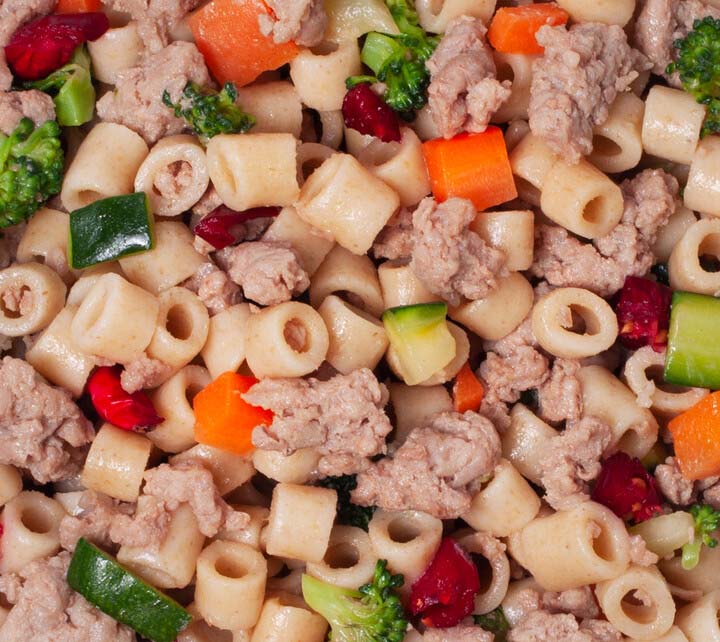
“Ground turkey is very good for dogs,” Su says. “It’s a versatile meat that’s readily available in different lean-to-fat ratios. You can go to the grocery store and buy ground turkey that’s 99% lean, 93% lean, or 85% lean. All have different nutritional properties and can achieve different health goals.”
“For example,” Su continues, “If your dog is experiencing gastrointestinal (GI) upset, a veterinarian might recommend a homemade diet of boiled chicken and white rice. If you’d like, use 99% lean ground turkey in place of the chicken.”
“Or if your healthy dog needs a daily, maintenance-type diet with diced veggies and healthy carbohydrates, JustFoodForDogs has a Turkey and Whole Wheat Macaroni Recipe. It contains 85% lean gently cooked ground turkey, which offers plenty of proteins, amino acids, and essential fatty acids.”
Again, explore these options with the help of a veterinarian or nutritionist. A professional can consider what else your fur baby eats and calculate exactly how much turkey and what kind they need to achieve an optimally balanced diet for your dog’s health.
One of the reasons many veterinarians recommend ground turkey for your dog’s diet is that there are no choking hazards like bones to consider.
Su advises cooking human-grade ground meat (whether ground beef or turkey) on the stovetop or in the oven to ensure it’s cooked all the way through.
If you want to feed turkey to your pooch, check out our DIY ground turkey for dogs recipe for making your own dog food in a slow cooker.
Visit our recipes page to learn how to make lamb and brown rice dog food, fish and sweet potato with green beans, and more. Make enough for a full email or just enough to use as a topper on dry food for picky eaters.
ARE TURKEY NECKS SAFE FOR DOGS?
So, we know that turkey meat, organs, and skin are good for dogs to eat, but what about turkey necks?
Su says that, while some pet parents give their dogs raw turkey necks as a treat, they shouldn’t because they contain bones. Bones can splinter or cause a blockage to the digestive tract.
However, that advice does not apply to the other “innards,” commonly known as giblets, you may find inside a turkey carcass, alongside the turkey neck.
According to Su, giblets—which include the turkey gizzard, kidneys, liver, and heart—are perfectly safe to eat once they are cooked. “Organs are high in essential nutrients and vitamins. Just be sure that you’re not overdoing it and giving your dog too much of any one nutrient. A balanced diet is key.”
ARE TURKEY BONES OK FOR DOGS?
It is never safe to give dogs turkey bones. As mentioned above, poultry bones are choking hazards and may lead to intestinal obstruction, which may require surgery to resolve. Su notes that many dogs are big enough to chew up turkey bones. Unfortunately there’s no guarantee that they’ll chew the bones up enough for them to become harmless.
“We all know how dogs eat,” Su says. “They’re not chewing carefully—they just sort of swallow. It’s usually OK and the bone will pass through the digestive system. But when they don’t pass, it can be a life-threatening condition that requires surgery.”
Su adds that if your dog eats any food with bones and experiences vomiting, diarrhea, constipation, or any other sign of upset stomach, like a lack of appetite, you should call your veterinarian right away to get your dog checked out.
ARE TURKEY TENDONS OK FOR DOGS?
Not all parts of the turkey are safe for dogs. Turkey tendons—and tendons in general—can be tricky, Su says. “I’ve seen tendons made into chewing treats. But if the pieces are too big, they can be difficult to eat and swallow. They can present the same choking concern as bones.”
If you’re looking to combine the nutritional benefits of turkey in a chewy or crunchy treat, Su recommends these healthy dog treats. They provide a balanced blend of nutrients, vitamins, and minerals in a variety of tasty, snack-sized, dog-approved flavors.
ARE TURKEY TAILS OK FOR DOGS?
Even though you can purchase turkey tails from certain pet retailers, Su advises against giving them to your dog, even as an occasional treat.
Not only do turkey tails contain bones, but they are also extremely high in fat. According to Smithsonian Magazine, “The tail is actually a gland that attaches the turkey’s feathers to its body. It is filled with oil that the bird uses to preen itself, so about 75% of its calories come from fat.”
Though some fats have nutritional benefits, to avoid serious health problems, pet parents should steer clear of any food that introduces that much fat into their dog’s diet.
GUIDELINES FOR FEEDING DOGS TURKEY
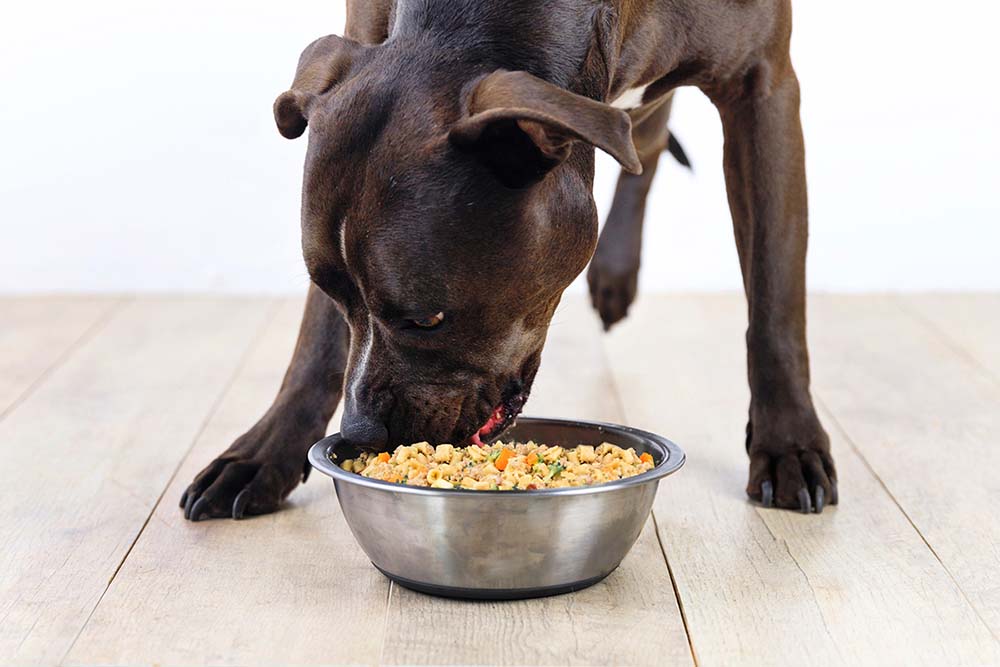
To recap, human food like turkey is a great lean protein rich in vitamins, minerals, and amino acids. Su encourages pet parents to look for ways to incorporate turkey into their dog’s meal plan so they can enjoy its many nutritional benefits year-round.
“There’s a big difference between sneaking your dog a small quantities of the Thanksgiving turkey and making turkey a balanced part of their diet,” Su says. “You want the turkey to be a part of their daily calories, not a treat that you give them on top of their existing meals.”
There are many ways to go about that, from home-cooked fresh food recipes made from scratch to commercial pet foods touting turkey as an ingredient.
Nutritionally-Balanced Is Key to Pet Health
Feed your pet a nutritionally optimized diet that includes the right ratios of lean protein and organ meat. To do so, Su recommends using recipes or supplements from a trusted dog food company.
With JustFoodForDogs formulations, that’s all taken care of. “You never have to worry about serving your dog too much Vitamin A or some other nutrient,” says Su.
JustFoodForDogs has a range of options featuring turkey as the main ingredient. “We have a Turkey & Whole Wheat Macaroni recipe that’s sold freshly prepared and frozen or in a shelf-stable Pantry Fresh option, as well as a DIY kit. We also have Balanced Remedy, a low-fat, turkey-based diet that may be helpful for dogs who need to avoid high-fat diets”.
As with any new food, dog owners should pay close attention when they introduce turkey into their dog’s diet. Su recommends starting your pet out slowly when introducing new foods. Consult your veterinarian if your dog experiences prolonged symptoms of digestive issues to determine whether it’s due to dietary changes or other health conditions.
This content is for informational use only and does not replace professional nutrition and/or medical advice, diagnosis, or treatment. It is not a substitute for specific nutrition and/or medical recommendations. Please talk with your veterinarian about any questions or concerns.
